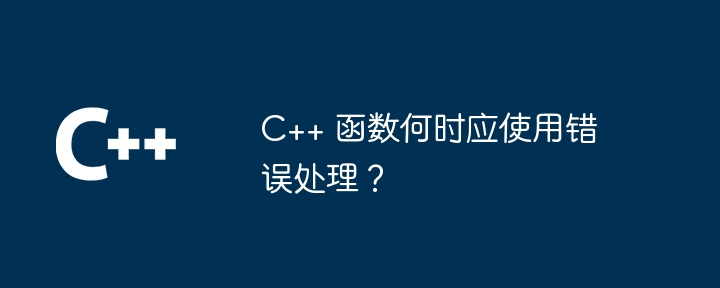Home >Backend Development >C++ >When should C++ functions use error handling?
When should C++ functions use error handling?
- WBOYWBOYWBOYWBOYWBOYWBOYWBOYWBOYWBOYWBOYWBOYWBOYWBOriginal
- 2024-04-24 09:51:02580browse
In best practice, C functions should use error handling to: throw exceptions to handle runtime errors. A failure code is returned to indicate that the operation failed. Handle predefined exceptions to handle exceptional situations.

Best Practices for Error Handling in C Functions
In C, error handling is essential for handling runtime errors and exceptions Crucial. Here are a few situations when a function should use error handling:
1. When the function may throw an exception
int divide(int num1, int num2) {
if (num2 == 0) {
throw runtime_error("除数不能为 0"); // 引发异常
}
return num1 / num2;
}2. When the function may return a failure code When
int openFile(const string& filename) {
ifstream file(filename);
if (!file.is_open()) {
return -1; // 返回失败代码
}
return 0;
}3. When the function needs to handle predefined exceptions
int readFromFile(const string& filename) {
ifstream file(filename);
try {
// 执行涉及文件读取的操作
...
}
catch (exception& e) {
// 处理文件读取异常
...
}
}Practical case:
Consider A function that reads a file:
string readFileContents(const string& filename) {
ifstream file(filename);
if (!file.is_open()) {
throw runtime_error("无法打开文件");
}
stringstream ss;
ss << file.rdbuf();
return ss.str();
}This function uses error handling to handle the following situations:
- Throws an exception when the file cannot be opened
- Make sure to handle file reads Get exceptions, such as insufficient disk space or permission issues
The above is the detailed content of When should C++ functions use error handling?. For more information, please follow other related articles on the PHP Chinese website!

